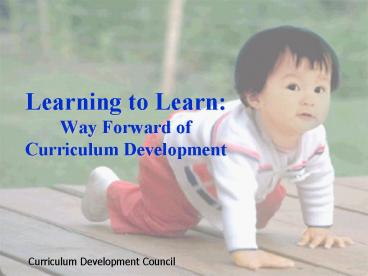Learning to Learn: Way Forward of Curriculum Development PowerPoint PPT Presentation
1 / 22
Title: Learning to Learn: Way Forward of Curriculum Development
1
Learning to Learn Way Forward of Curriculum
Development
Curriculum Development Council
2
Overall Aims of Education
E
nabling our students to enjoy learning
E
nhancing their effectiveness in communication
D
eveloping their creativity
D
eveloping their sense of commitment
3
Vision of the Curriculum Reform
Learning to Learn, Learning for Life An
Adaptable Teaching Culture, An Evolving Curriculum
4
?Learning How to Learn?Consultation Document
The 3 Questions to explore
- What are the experiences of curriculum
development in Hong Kong? - What is worth learning in the school curriculum
to achieve the aims of education for the 21st
century? - How to facilitate effective teaching and learning?
5
Learning to Learn
- to develop the ability of independent learning,
e.g. creativity and critical thinking skills - to be able to learn in a variety of ways
- to become self-reflective
- to enlarge the space of learning
6
The 7 Learning Goals
- recognize their roles and responsibilities in
family, the society and the nation - understand their national identity and be
committed to - develop a habit of reading independently
- engage in discussion actively and confidently in
English and Chinese - master independent learning skills
- possess foundation knowledge in 8 KLAs
- lead a healthy lifestyle, and develop an interest
in and appreciation of aesthetic and physical
activities
7
Five Learning Experiences
- Moral and Civic Education
- Intellectual Development
- Community Service
- Physical and Aesthetic Development
- Career-related Experiences
8
8 Key Learning Areas
- English Language Education
- Chinese Language Education
- Mathematics Education
- Personal, Social Humanities Education
- Science Education
- Technology Education
- Arts Education
- Physical Education
9
Generic Skills
- Collaboration Skills
- Communication Skills
- Creativity
- Critical Thinking Skills
- Information Technology Skills
- Numeracy Skills
- Problem Solving Skills
- Self-management Skills
- Study Skills
10
Values Attitudes
Cultivate positive values attitudes through
curricular cross-curricular learning activities
such as moral/civic education, environmental
education, sex education, etc.
Moral/Civil Edu.
Sex Edu./Environmental Edu.
Life-related topics
11
(No Transcript)
12
A New Culture of Learning Teaching
- From transmission of knowledge to learning how to
learn - From over-emphasizing academic studies to
focusing on whole-person - From compartmentalized subjects to integrated
learning - From reliance on textbooks to use of diversified
learning and teaching materials - From classroom teaching to learning beyond the
classroom, with support from the community - From traditional time-tabling to an integrated
and flexible arrangement of teaching time - From premature streaming to providing more
opportunities for students to explore their
aptitudes and potentials
13
- Building on schoolsexisting effective
teaching/learning practices - Building on schoolsexisting effective
teaching/learning practices - Building on schoolsexisting effective
teaching/learning practices - Building on schoolsexisting effective
teaching/learning practices - Building on schoolsexisting effective
teaching/learning practices - Building on schoolsexisting effective
teaching/learning practices - Building on schoolsexisting effective
teaching/learning practices
Changes inside outside the classroom
- Trimming some teaching topics
- Reducing mechanical drill-typed exercises
- Balanced curriculum, life-wide learning
- Designing cross-curricular modules/projects
- Arts curriculum incorporating science elements
and vice versa - Promoting a reading culture
14
- Creating a good learning environment
- Creating a good learning environment
- Creating a good learning environment
- Creating a good learning environment
- Creating a good learning environment
- Creating a good learning environment
- Creating a good learning environment
- Creating a good learning environment
- Creating a good learning environment
- Creating a good learning environment
Changes inside outside classrooms
- Reducing no. of tests and exams
- Using different modes of assessment
- Catering for learner differences
- Flexible time-tabling arrangement
15
An Exemplar on flexible use of lesson time
- 10 lesson time for moral/civic education, life
skills library studies - 1/2 day in a week for learning activities outside
school - cross-curricular activity day in the
beginning/end of term - different subjects to be offered in four terms in
a year
16
Key Support to Teachers/Schools
- Providing diversified training courses
- Setting a resource bank for exemplars
- Providing on-site support to enhance quality of
teaching learning - Implementing seed projects introducing
evidence-based findings from related research
development projects
17
Phases of Curriculum DevelopmentIncremental
Cumulative
Long-term
Medium-term
2010
Short-term
2005
2000
2010
2005
18
Short-term2000 to 2005
- Time for teachers and schools to strengthen
learning to learn in existing curricula - Time for transition to the new curriculum
framework through the development of school-based
curricula with support of government - Generating and sharing experiences
19
- Medium-term
- To enhance the quality of education by adopting a
school-based curriculum in line with the open
curriculum framework
20
- Long-term 2010
- Vision for life-long learning
21
Society-wide Mobilisation, Support of Other
stakeholders
Govt
School Heads Middle managers Teachers Librarians
Parents
Students
Other Sectors of Society
22
Consultation Period Late November 2000 to 15
February 2001

